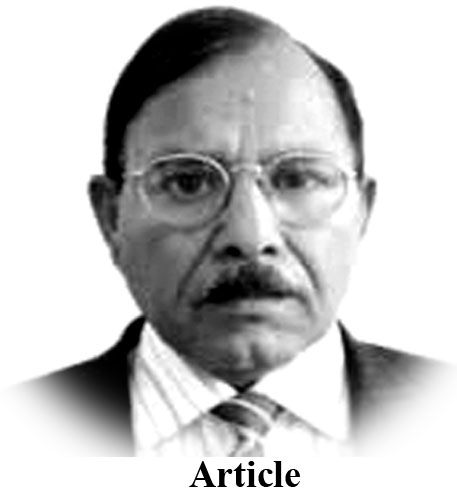Malik Ashraf
THE FATF plenary session being held in Paris from 16-21 February will decide whether Pakistan remains on extended grey list or comes out of it. In the run up to this meeting there have been some very encouraging developments that suggest a positive outcome at the moot. Alice Wells, Acting US Assistant Secretary of State for South and Central Asian affairs has stated that conviction of Hafiz Saeed by a Pakistani court was an important step forward in regards to “both holding the LeT accountable for its crimes and for meeting commitments of the Khan government in combating terrorist financing”. Earlier the FATF meeting in Beijing in December had also expressed satisfaction over the compliance report submitted by Pakistan in spite of best efforts by India to ensure penalties on her. No member of the FATF including US and EU supported the Indian view. The outcome of Beijing moot represented a major blow to the Indian diplomatic efforts to penalize Pakistan. Turkish President Tayyab Erdogan addressing the joint session of Pakistani Parliament also reiterated its support to Pakistan on the issue. In fact it was due to the support extended by China, Turkey and Malaysia that Pakistan could not be pushed to the black-list and has stayed in the grey list.
Pakistan requires mustering up diplomatic support for its efforts to come out from grey list and land into the white as it will need 12 votes out of total 39 in the plenary meeting. Pakistan was put on the grey list by FATF in June 2018 as a result of the US resolution supported by its allies and other countries. Placing Pakistan on the grey list was surely a political move by US with a view to keeping Pakistan under pressure. It was very much expected in the backdrop of the nosedive in relations between Pakistan and USA since the announcement of the new Policy on South Asia and Afghanistan by President Donald Trump and its outright rejection by Pakistan. It was the most unfortunate development in view of the fact that Pakistan which had been the US ally since early fifties and had suffered the most in the war against terrorism remained a suspect in the eyes of the latter in regards to its indiscriminatory action against the terrorist outfits.
The reality is that Pakistan has been a sincere partner in the war on terror and has not only dismantled the infrastructure of all the terrorist outfits based on its territory including North Waziristan but also is faithfully engaged in eliminating the remnants of their supporters within the country. It has also taken all possible administrative and legal measures to check and block the sources of funding to the terrorist organizations. Pakistan had already promulgated a Presidential Ordinance to amend the anti-terror legislation in order to include all UN-listed individuals and groups in the national listings of proscribed outfits and persons. Securities and Exchange Commission of Pakistan (SECP) also took measures in keeping with the FATF regulations and issued Anti-Money Laundering and Countering Financing of Terrorism Regulations 2018. The government had also chalked out a comprehensive plan to eradicate terrorist financing which was shared with the international watch-dog. The FATF decision was reflective of the US rhetoric of ‘do more’. It was also indicative of how much influence US could exercise on world bodies like FATF.
It is pertinent to point out that a Spokesman of the Chinese Foreign Ministry referring to FATF decision had said, “In recent years, Pakistan has actively taken measures to strengthen financial supervision and crack down on terrorist financing and made important progress. We have always believed that the great efforts and sacrifices made by the Pakistan government and people for the fight against terrorism are obvious to all. The international community must give full recognition and trust to these efforts and treat those efforts objectively and impartially instead of relying on criticism and pressure” The statement adequately unravelled how the decisions were taken under pressure at the global forums.
Before the Beijing meeting, Pakistan had done its homework well. Besides taking administrative and legal measures to comply with the FATF requirements it also undertook intensive lobbying and diplomatic efforts to muster support for her cause. Foreign Minister Shah Mahmood Qureshi met US Secretary of State Mike Pompeo and discussed the issue with him seeking support for getting out of the grey list. Prime Minister in his meeting with President Trump on the sidelines of Davos Forum among other things also deliberated on the issue of FATF. The relations between US and Pakistan which had gone into a nosedive when President Trump announced his policy on Afghanistan and South Asia, have been transformed into a renewed bonhomie due to the role that Pakistan has played in bringing the US and Taliban on the negotiating table which has almost brought the two sides close to an agreement to end decades old conflict in Afghanistan.
In view of recalibration of relations between US and Pakistan and the concrete and credible steps taken by Pakistan ever since placement in the grey list and positive vibes emanating from the Beijing meeting it could be genuinely hoped that things would have a positive outcome at the current session of FATF in Paris. Pakistan’s removal from the grey list and upgradation to the white list is absolutely imperative in regards to getting financial support from the international lending agencies for financing its economic reform agenda and putting the country on the road to a sustained economic growth besides political gains on the international level.
— The writer is freelance columnist based in Islamabad.










